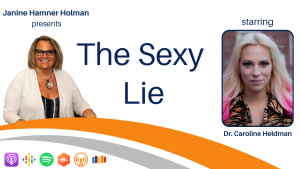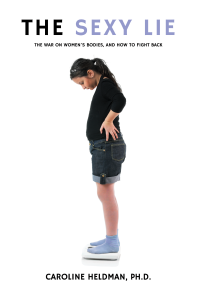
How much have you thought about how the world views women and men, as people, or sex objects? In this episode, Janine Hamner Holman sits down with Dr. Caroline Heldman, a professor, author, political commentator, and activist, to discuss the “sexy lie” we’ve all been told.
GUEST: Caroline Heldman | LinkedIn, Instagram, Facebook
HOST: Janine Hamner Holman | Janine@JandJCG.com | LinkedIn, Facebook, Instagram
What am I paying attention to today? I had a difficult experience about two weeks ago. I was at a city council meeting in a city in southern California. It is a wonderful city where I’ve had the opportunity to work consistently over the last 15 years. It’s a working-class city. It also happens to be almost all Latino, about 98% Latino.
I was there to make an announcement about a program on which I’m working. It became apparent fairly quickly some folks were there to protest a potential decision the council might be making they are angry about. There were about 25 or 30 people there on this issue, and as sometimes happens, they were upset. One issue got rolled in with their upset about race, economic injustice, and some other issues.
They were filming themselves and the council. Unfortunately, as things progressed, their outrage morphed into bullying, trying to bully the council and then me. As I sat in the audience, because I am white and was sitting in the front of the audience, and in this Latino community, they ended up taunting me and calling me names, mostly about the fact I am a white woman.
Eventually, it escalated and they turned their phones on me so they were filming me and then they put a cartoon face of a pig over my face. That escalation was when my emotions became hard for me to manage. As regular listeners know, or anybody who follows me, I am a person who has struggled with my weight my whole life. When I was the racial object of their hate and vitriol it was easier. When the pig face happened, it felt like something turned and it became more personal and hurtful.
I’m telling you this story today because it is directly connected to our guest and because it’s about how easily we dismiss people by the container they are housed in, in this case, the container in which I am housed rather than the content of our hearts and minds and souls. Which brings me to my guest for today.

Dr. Christine Heldman is a professor. She’s an author, she’s a political commentator, and she’s an activist. Her work focuses on systems of power and social injustice in the United States. She researches race, gender ability, body size, age, and sexuality in politics and in popular culture. Welcome to the show, Christine.
So good to see you, Janine. Thank you. It’s wonderful to be here.
I’m so thrilled to have you. Let’s get into this. I got to see you present two months ago, talking about women, power, gender, and politics. As you think about the world, what is something you’ve become aware of we are not paying enough attention to, either consciously or unconsciously? What’s the cost of our inattention?
My response is two-fold. The first is a really big issue, which none of us are talking about in terms of public policy. The underlying issue is we evaluate, primarily girls and women, but we evaluate everybody, based on their physical form in ways that are not meritorious. I think fatphobia is the next big social justice.
It is one where, when you look at rates of discrimination, every form of discrimination has declined. If you look at the Harvard implicit bias test in the past decade, everything is declining with the exception of LGBTQ+. It’s staying about the same, but we see bias against fat folks increasing tremendously.
I should take a step back and say I’m using fat as a descriptive term. It is not derogatory in any way, shape, or form to me. I want to live in a culture where that is just an aspect, it’s a descriptive term. The reason I think this is such a pressing issue is because of the toll it takes on fat people who are, by the way, about 40% of the American population according to the CDC.
We have two in five Americans facing employment discrimination, dating discrimination, and loan discrimination. There are all these different ways it plays out. They’re facing discrimination in professional settings. They’re also experiencing direct vitriol oftentimes, as you just shared, in public settings. It happens all the time.
I think straight-sized folks think they have a moral superiority because we’ve associated that with body size. I want to briefly go through some myths. It is a myth that you control your body size, 80% of it is determined by genetics. We all know 95% of diets fail, A yo-yo diet has profoundly negative effects on your health long term. You cannot tell somebody’s health based on their size.
We also know if you have a slightly higher BMI, not the extremes of being underweight or very fat or very thin, but if you are considered 30 to 35 BMI, which, we can talk about how BMI is not a great measure. If you’re a little plump, you’re going to live longer. Don’t tell me it’s this straight correlation between body size and health.
Beyond that, there’s this kind of morality tied up into it because the medical establishment makes people feel like the concern is about their health. How about just everything else to do with my body? Other people don’t need to get involved, it’s not their concern.
I want to live in that world. I want to live in a world where 40% of Americans don’t face discrimination, vitriol, and other things with profoundly negative effects on a daily basis.
Part of what’s so challenging about talking about any of the things related to the container, whether we’re talking about race, whether we’re talking about a man who is in a slight body, whether we are talking about a man or a woman who’s in a bigger body, and I know from talking with men in larger bodies, it’s easier to be a man in a larger body than it is to be a woman in a larger body, because of all of this stuff you so brilliantly talk about in your book, The Sexy Lie, which we’ll get into in a minute.
Women’s bodies are so connected to our senses of self in a way a man’s body is not. When we focus on the container rather than on the human, so much mischief gets created.
In the work you’re doing, and in the work I’m doing, focused on diversity, equity, inclusion, and belonging, the mischief that gets created when we focus on the container rather than the content of somebody’s soul is so detrimental to strong working relationships, strong romantic relationships, and healthy personal relationships with ourselves.
Regardless of what anybody else says, so many of these messages end up getting internalized about who I’m supposed to be, who you are supposed to be, and who men are supposed to be.
What do we do about it when we realize we’ve internalized those thoughts and feelings?
I drove my car, which is a very cute little car, up to a strip mall. I parked right in front of a frozen yogurt place, and I had the lights on because it was dusk. This young, cute couple was in the window, and the lights from my car were shining in on them. They looked out at me and they started laughing, the two of them, in their conversation.
I of course have no idea whether their laughter had anything to do with me, but I made up a whole story in my head that they were laughing because I am in a larger body and parking in front of a frozen yogurt store. I thought they were saying, “What business does this fat person have parking in front of this store?”
I felt it, and I made all of that happen. They didn’t come out and say anything to me. This was a whole thing happening in my brain.
When we realize we are at the effect of these systems in which we live, which are so much about what the container is supposed to look like, how do we start to break that down for ourselves internally?

That’s a great question. It’s an individual response to a structural problem. That’s why it’s so difficult. You have every reason to believe they’re laughing at you because of your body size.
I’m not going to speak for you, but I can say, looking at survey data and having a lot of friends who have told me stories and colleagues who’ve told me stories about what they face, people of size are constantly facing remarks and discrimination. Sometimes you’re on an airplane, and people think it’s okay to be nasty to folks of size even though we’re all cramped in.
That’s the perfect example of how we’re all in this together. Everybody is scrunched on a plane, but you’re going to get mad at someone of size because they happen to be seated next to you.
There’s all sorts of nasty vitriol thrown at folks of size constantly. We could be talking about race, we could be talking about ageism. We could be talking about somebody’s apparent sexuality. We could be talking about whether or not somebody has an obvious disability.
They’re all of these different kinds of systems of power we’re talking about. But you’re right that women and girls are much more evaluated based on their bodies. If you look at the structures that cause this to be such an issue for women, we have men who are mostly evaluated based on prestige and based upon income. With that said, they’re also supposed to kind of embody masculinity.
Short men face a lot of similar discrimination to women who don’t fit some hegemonic culturally acceptable idea about what you should look like, which of course shifts over time, but it’s always unachievable.
For girls and women, we are taught from a very we age that our primary value is our bodies. It doesn’t matter what else you achieve, you can instantly be reduced to nothing by somebody talking about your body. That’s what happened at this public event you attended.
It doesn’t matter what your accomplishments are, what you’ve done, or what you have to bring to the table in the conversation. You’re immediately dismissed based on your body size as a woman. We raise our little boys, as Sarah Menan puts it, to view their bodies as tools to master their environment. We raise little girls to view their bodies as projects to constantly be worked on.
This isn’t happenstance, it’s systems, it’s patriarchy where we value men and what they do more than women and what they do, plus capitalism. There’s a $60 billion-a-year diet, fitness, and beauty industry with a great stake in making sure primarily women, they would love to bring men into this, but it hasn’t worked, aren’t satisfied.
How do you do that? You present impossibly airbrushed, incredibly thin unachievable standards of beauty. The further the distance between where someone thinks they are and where they think they need to be, the more products they will buy.
In my book, The Sexy Lie: The War on Women’s Bodies and How to Fight Back, I talk a lot about how women are suffering in silence about constantly viewing their bodies as projects. They’re never good enough, with body hatred and shame.

We know the more likely you think of yourself as a sex object, which means you’re seeking attention from the outside world and you view your status based upon how desirable you are as a sex object, mostly to the heterosexual male gaze. It’s a general thing where we’re constantly worried about our appearance.
In fact, researchers out of the University of Michigan find there is a balance between the amount of time we spend on what’s called habitual body monitoring and thinking about our bodies over the course of our lifetime and the time it would take to earn three PhDs, it’s ridiculous.
Wait, wait, wait, wait, the amount of time we spend worrying about our bodies, we could earn three PhDs instead?
That’s right. Imagine what we could do if we weren’t raised in a culture saying, “You have to constantly think about your body.” I should point out that it’s always shocking to men. I speak with mostly my students when I tell them, “Women are constantly thinking like, “Oh, well, if I sit this way, this angle’s going to be better, I’ll look thinner, I’ll look better.’”
We do that a thousand times a day when we’re out in public. Maybe a thousand is overstating the case, but it might not be. We are constantly pitching ourselves to men at stoplights whom we’ll never see. It’s the most ridiculous, constant transfer of power.
The sexy lie, which is the title of the book, is that being a sex subject is empowering. It’s not empowering. We simplify our thinking in the world in terms of this particular binary: the subject-object. When we’re talking about sex objects, we’re talking about the subject-object, binary sexual subjects act, and sexual objects are acted upon.
By definition, even if you’re the most valuable sex object for that 2:35pm on a Tuesday, that one day you finally achieve it, you’re still in a subordinate position to everyone you are performing for. It’s important to bring up the distinction between being sexual, which is about your own sexual pleasure, and being sexy, which is about performing sexual pleasure for others.
At the heart of this is sexual objectification and the process of turning a human being into an object to exist for your sexual desires.
We know your initial question about what are the ramifications of the cost of that. We now know, from almost three decades of research, that the more you think of yourself as a sex object and internalize this idea of self-objectification, as researchers call it, which I don’t love because it makes it seem like it’s an individual issue when it’s a structural issue…
We know we have higher rates of depression, body hatred, and shame. We have lower rates of political efficacy, which is believing your voice matters. We have heightened eating disorders. We’re less likely to be engaged in politics and in social systems. It also lowers your GPA, and it relates to so many areas of life.
That’s what you’re talking about when you talk about the cost of internalizing this societal system. I go through a lot of ways we can push back against it, but unfortunately, anytime you’re dealing with a cultural system, it’s difficult to truly transcend it.
That’s part of why my question was more focused on the, what do I do? Because what do we do? That’s a big systemic question, and you do pose some answers to it and ways in which we can respond in your book.
When I think about some of the objectification we internalize, it’s hard. As you so rightly put it, it’s sexual education, but it’s based on our sex, our gender, and on wanting to be appealing to men in particular. It begins so early, when we’re little kids.
At that point, there is nothing in our brains, and hopefully in the brains of anybody with whom we’re coming in contact that has to do with sex. So much of it is about how we value little girls.
Earlier today, I was in a two-hour planning session with a relatively young CEO who is about to be the father of his second daughter. He has a son and a daughter, and in August, his new daughter is coming.
I was thinking about that, having been reading your book and refreshing my thoughts on it over the last few days, I was thinking about the fact my friend Mark, the CEO, is going to be welcoming this new little girl and how common it is we say to little girls things like, “Oh, you’re so pretty.” That makes them good. We almost never say to little boys, “Oh, you’re so handsome.” In a way that is equating their physicality to being, their beauty, to being good.
We do that with young girls, and then we just continue with the practice. One of the things I was struck by when I got to see your presentation a couple of months ago was how this rolls over into places we might not think about, like politics.
Regardless of where you fall on the political spectrum, if we think about Sarah Palin, Michelle Obama, or Hillary Clinton, the way they were treated was largely based on physicality. Can you talk about that a little bit and how this all connects back?
Absolutely. It gets into the brain in psychology and cog science in terms of how we view sex objects. You bring up an interesting point. The most damaging words you can tell a little girl are, “You’re so pretty,” and the most damaging words you can tell a little boy are “Be a man.”
We go into this at the Representation Project in our film Miss Representation. In our other film, The Mask You Live In, we focus on how damaging those messages end up being. They’re so damaging that, and obviously damaging that when men become sex objects, they reject it. Rob Lowe and Brad Pitt have gone through it. They don’t like being reduced to a sex object.
Yet that is what every woman and Hollywood is supposed to be striving for. It’s a much bigger issue at stake here, which is when you turn half of your population… when the norms of their behavior and the way they’re evaluated are objectifying, and you sexually objectify them, when you turn them from humans into an object, that’s the first step in violence toward that group.
It is not surprising one in three women will experience domestic sexual violence or stalking over the course of her lifetime. It affects us in lots of different realms. You’re asking specifically about politics? We know from brand psychology when you see a sex object, everyone, men and women, gender nonconforming folks, view a sexually objectified woman as a collection of body parts instead of a whole person. We dehumanize in that way.
Other studies have found that for men, heterosexual men who view a sexually objectifying image of a woman, the part in their brain that activates when they’re going to use a tool, is the same part in their brain that activates when they see a woman who is a sex object.
We find that when we sexually objectify women, we care less about their pain and suffering and specifically, women political candidates. So what happens is, across party lines, and especially amongst Republicans, there was a big gap. If you saw Sarah Palin as a sex object, then you were less likely to support the Palin-McCain ticket.
It had an electoral outcome, less supportive. Celinda Lake, who’s a Democratic pollster, tried to figure out what was going on for future elections. She found that the moment at which a woman candidate is presented as a sex object, her levels of competence are perceived as lower.
She is perceived as less competent if she’s a sex object. Now, we see this in workplace settings as well. A couple of studies have been done, one in particular that stands out is that your competence levels diminish if you are seen as a sex object in the workplace.
That said, specifically, if you are in a secretarial or supportive position at a low rung in a corporation, it doesn’t affect your competency as you move into positions of leadership.
Now, am I trying to slut shame women? Absolutely not, but it’s important to know this is how the world works when you’re going out and making decisions about how you’re dressing and how you want to be perceived. I don’t make the rules, but boy, I’m here to help figure out what they are.
Women, especially women in leadership positions, their perceived competence is diminished if they are sexually objectified. What does that tell you? We raised an entire generation, generation after generation, of girls and women to believe their body is their most valuable asset and they should seek sexual objectification. That’s the height of our existence, yet it harms us in social, political, and economic ways.

Part of what’s so tricky about this is, if we think about somebody like Michelle Obama, who was one of the younger first ladies, and then we think about somebody like Hillary Clinton, obviously a significantly more mature woman. Yet they both were victims of the same kinds of sexualization. I mean, Hillary Clinton is running around in flat shoes and pantsuits.
There’s nothing intrinsically sexy that she’s doing, having her be sexy, and yet she is being objectified. People are judging her based on her pantsuits, her hair, her cleavage, her face, all the things we judge in women.
I’m back to what do we do, Caroline? What can we start to do as individuals, as business owners, and as consumers?
Janine, quickly before answering that, you brought up Michelle Obama, which makes me think about misogynoir, which is racism and sexism put together. It’s this fascinating point, which is that she wasn’t just sexually objectified or desexualized or however sexuality was used.
Her sex appeal was used as a basis to determine her value. She was also animalized because she’s a black woman, so it’s sexual object objectification, plus she was masculinized. It speaks to, it’s not just this impossible standard. It’s a thin, white, blonde standard of beauty in the United States. It’s a narrow, rigid, European standard.

What can we do? We can think about it at the individual level. When it comes to the sexy lie, it’s a structure.
It is a system where, even if you achieve the maximum amount of value, you’re still going to be second to sexual subjects who are men. We all see about 5,000 images if we’re moving through the world in advertising and media content per day. Many of those are sexually objectifying women with this idea that sex sells except most women are heterosexual, so sex is really selling.
We have sex drives that look very similar to men’s. Why aren’t we seeing images of half-naked men everywhere? There’s a very specific reason: because it doesn’t work the same way. It’s not about sex selling, it’s really about power. Women are looking at sexually objectifying images and we are thinking, “Oh, that’s how to be the ideal sex object.” Men are looking at those images and they are saying, “Oh, I’m a sexual subject.”
It’s a constant reminder of women’s object and secondary status in our culture. What’s fascinating about that is gay men sexually objectify women at similar rates to heterosexual men, which speaks to the fact that it is about power. It is not actually about sex selling.
What can we do? We can recognize it as the big lie, not the big election lies, as the big lie that affects my life type of lie. If you look at the empirical and theoretical evidence, it’s pretty clear it’s a lie.
It’s also a system that, by definition, will exclude most women of color. It’s a system that promotes colorism, even within communities of color. It’s a system every woman is going to age out of.
I don’t know if you’ve seen that comedy sketch My Last F@#*able Day with all of these women from Hollywood, but even if you achieve that maximum status, you’re not going to hold it forever.
It’s women against each other, intergenerationally. It creates female competition across generations, and mothers and daughters. It is such a destructive force in the lives of girls and women, and our dehumanization sets us up for violence.
What do we do? We recognize it’s a lie. We recognize we maybe can’t transcend the system, and in fact, if we don’t play the game to a certain extent, it’s going to harm us too. I bring this up because wearing too much makeup harms you. Our standards of beauty also harm you.
Looking at it, navigating that media literacy, being able to recognize how these images are affecting us. We know from one experiment you read, a women’s magazine, I mean, it’s an anti-women’s magazine as far as I’m concerned, if it has that label.
You read the magazine and within three minutes your self-esteem is plummeting as you’re looking at these images of unrealistic beauty standards and airbrushed and hegemonic white blonde bodies.
Recognizing it, media literacy, and then I talk about building armor. I use a lot of war metaphors because why not? It’s about building your armor. You go out every day using, I have a sexy lie, seven-day cleanse. You can reset and say, “Okay, this is what these images are doing to me or these… these patterns of behavior, this is how they’re affecting me.
Also, journaling about habitual body monitoring. What comes into your head immediately? Put it into your phone so you can track it over the course of the day. You can find out how many things, how often the sorts of things, and how often you are saying things to yourself that you would never allow anyone else to say to you.
Looking at that, and of course, the learning, as those tapes and the nasty talk into your head, to let it go. Similar to meditation. There’s a lot you can do. You also strategically make choices about your appearance and know you’re going to be making those choices because they’re going to benefit you in this particular setting. By and large, you can kind of release this pressure.
Once you recognize a sexy lie, it becomes hard to actively and enthusiastically participate in it. In terms of women who are sexually objectifying themselves, big hugs.
Am I critical of the system? Don’t tell me it’s empowering. You can do whatever the heck you want to do, but am I going to go after someone, the 0.003% of people who might be benefiting economically from it, even though it’s costing them probably at a human level tremendously?
I’m absolutely not going to be critiquing them. I might point it out, but in a very loving way that recognizes they are products of a broken system as well.
I love that. Caroline, thank you so much for your deep understanding of all of this, for your compassion, for your energy and verve around the vision we can live in a world that is different from the one that we do now, and all of the great work you are doing to move us forward in that direction.
Thank you so much, Janine. What a joy. What a pleasure. Right back at you, right? It’s these sorts of conversations. I mean, we think, oh, social justice is these big sweeping changes. It’s actually just the everyday.
Precisely, thank you. I am Janine Hamner Holman, and this has been The Cost of Not Paying Attention. Remember, great leaders make great teams. Until next time.
Important Links
About Dr. Caroline Heldman
Dr. Caroline Heldman is a Political Scientist and Chair of the Gender, Women, & Sexuality Studies program at Occidental College in Los Angeles. She is also the Executive Director of The Representation Project and a political commentator for Spectrum and CNN International.
Dr. Heldman has published seven books on gender justice and politics, and her work has been featured in numerous documentaries, including Miss Representation and The Mask You Live In. She co-founded the New Orleans Women’s Shelter, the Lower Ninth Ward Living Museum, End Rape on Campus (EROC), Faculty Against Rape (FAR), and led the End Rape Statute of Limitations (ERSOL) that successfully abolished the time limit on prosecuting rape in California.
She is the Board President of the TEP Center, the first Civil Rights museum in New Orleans, and the Chair of the Board of Alturas Institute, a non-profit fighting for stronger democracy.






